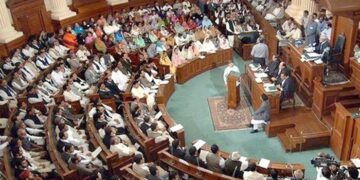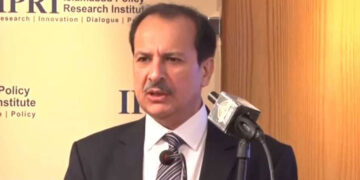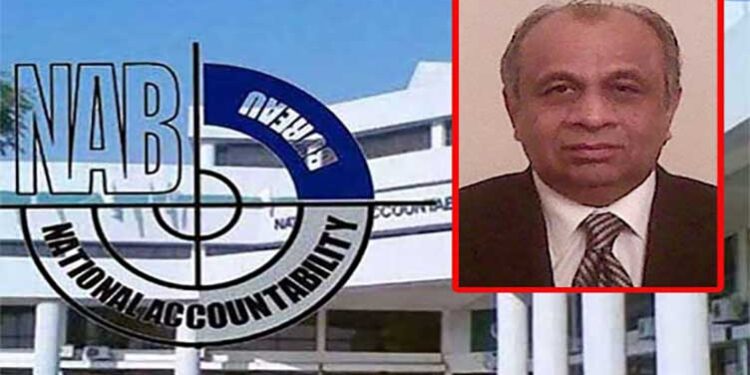In a significant development leading up to a highly anticipated Supreme Court judgment, NAB Prosecutor General Asghar Haider announced his resignation on Saturday. The Supreme Court is set to reveal its decision next week concerning a case that challenges the amendments made to the National Accountability Ordinance by the previous PDM government.
The timing of Haider’s resignation, just days before the verdict, adds another layer of conspiracy to an already closely-watched legal battle that has wide-ranging implications for the country’s political and legal landscape.
During the final hearing overseen by a three-member Supreme Court bench, Chief Justice Umar Ata Bandial dropped hints regarding the impending decision.
In his remarks, CJP Bandial mentioned, “We will soon announce a short and sweet verdict of the case.” Such a statement from the Chief Justice has added to the suspense and has political and legal analysts considering about the nature of the upcoming ruling.
Furthermore, with Chief Justice Bandial’s retirement date set for September 16, which falls on a Saturday, it is widely expected that the apex court will pronounce its judgment no later than Friday.
This tight timeline further emphasizes the significance of the forthcoming announcement and ensures that all eyes will be on the Supreme Court as the week draws to a close.
Amidst the whirlwind of events, speculation was rife regarding the underlying reasons for Haider’s abrupt decision to step down. Addressing these conjectures directly, Haider described his resignation as “quite normal,” striving to detach it from the broader narrative of the imminent Supreme Court verdict and CJP Bandial’s impending retirement.
His reassurances sought to put to rest any notions that his exit had ties to the upcoming announcement or any external pressures.
It’s noteworthy that Asghar Haider has enjoyed a unique position during his tenure as the Prosecutor General. He was the only individual to be awarded an extension for an entire second term, underscoring his pivotal role and the trust vested in him.
This fact makes his resignation even more significant in the eyes of observers and further emphasizes the weight of the ongoing political and legal developments.
Haider was initially appointed to his esteemed position in January 2018 by the then-prime minister, Shahid Khaqan Abbasi. In a move that demonstrated continuity and perhaps respect for the institution, his tenure was extended by the PTI government, albeit through an ordinance.
This move, while consolidating his position, also raised questions in light of the existing legal framework surrounding such appointments.
Before his tenure with the NAB, Haider held a position as a judge of the Lahore High Court. However, his career at LHC met a controversial end when he was removed from office after taking an oath under the Provisional Constitution Order (PCO) promulgated by Gen Musharraf on November 3, 2007.
It’s pertinent to mention that the NAB law explicitly prohibits an extension in the tenure of the prosecutor general. As stipulated in Section 8(a)(iii) of the National Accountability Ordinance, “The Prosecutor General Accountability shall hold office for a [non-extendable] period of three years.” This raises questions regarding the validity and implications of the extension given to Haider.
Insiders have shed light on the personal dynamics at play, highlighting that Haider shares a close camaraderie with the Chief Justice, Bandial, who is set to retire in the forthcoming week.
However, when reached for a comment by Dawn, Haider did acknowledge the close ties with Justice Bandial. Yet, he was quick to underscore that the impetus for his resignation had a distinct origin, unrelated to their friendship or any conjecture surrounding it.
Haider further pointed to the National Accountability Ordinance (NAO) which outlines the prerequisites for the position of prosecutor general. Section 8 of the NAO clearly elucidates, “The President of Pakistan, in consultation with the Chairman NAB, may appoint any person, who is qualified to be appointed as a Judge of the Supreme Court, as Prosecutor General Accountability.”
This provision establishes the rigorous criterion for the position, emphasizing its significance in the national legal and governance apparatus.
Drawing parallels between the roles, Haider elaborated on the retirement age stipulations, emphasizing that since a Supreme Court judge retires at the age of 65, he firmly believes the same criteria should ideally apply to the position of Prosecutor General.
This perspective sheds light on his recent decision to step down, as Haider celebrated his 65th birthday on July 21. Reflecting on his tenure and the impending retirement age, he disclosed that the thought of resigning had been on his mind for the past three months.
As he prepared to take this significant step, Haider ensured transparency by communicating his decision to the relevant authorities. However, his perspective on the retirement age was met with a differing viewpoint from the NAB.
According to the organization’s interpretation, there exists no defined upper age-limit for the superannuation of the Prosecutor General, as he explained. This divergence in interpretations, combined with the milestone age, undoubtedly played a role in shaping Haider’s recent decisions.
In the backdrop of NAB’s ongoing investigations into cases against PTI Chairman Imran Khan, a pivotal question was raised regarding Haider’s resignation. When questioned if his departure was a result of his reluctance to sign the upcoming references against Khan, Haider categorically denied any such reasons.
It’s worth noting that NAB is currently looking into two significant cases against Khan — one involving alleged corruption to the tune of 190 million pounds and the other concerning the Toshakhana gifts.
Regarding the succession in the wake of Haider’s departure, the relevant laws provide flexibility to the NAB hierarchy. As stipulated, the NAB chairman possesses the authority to assign the PG charge to any Additional Prosecutor General (APG).
According to insider sources, APG Akbar Tarar emerges as a likely candidate to assume the PG role, at least in the interim. Tarar, with his extensive experience spanning approximately 15 years in the bureau, has established himself as a seasoned figure, making him a strong contender for the position.
If the Supreme Court were to overturn the amendments, it would likely have sweeping ramifications for the cases returned to NAB by the accountability courts. Insiders suggest that these cases would effectively be re-opened, paving the way for a potential reshuffling of the legal landscape.
At the heart of this amendment is a significant change that limited the powers of NAB: it proposed that any case involving an amount less than Rs500 million would not fall under NAB’s jurisdiction.
Furthermore, the amendment introduced modifications to Section 19E, effectively curtailing NAB’s oversight capabilities. Specifically, NAB’s authority to permit surveillance activities with the aid of a high court has been retracted.
Another pivotal change is in how NAB interacts with other investigative bodies. With the new guidelines in place, NAB is prohibited from initiating or taking cognisance of cases that may overlap with or potentially fall under the jurisdiction of other investigative agencies. The potential reversal of these amendments could mean a renewed period of activity and jurisdictional clarity for NAB.
What is NAB and its importance
The National Accountability Bureau (NAB) has a storied history that traces its origins back to the late 20th century. Established in 1999, NAB was conceived as a response to escalating concerns over corruption and fraudulent practices within Pakistan.
The bureau was intended to be a watchdog – an autonomous body tasked with the elimination of corruption through a holistic approach encompassing awareness, prevention, and enforcement. From the outset, it was vested with the power to conduct inquiries, investigate, and prosecute those involved in economic and white-collar crimes, especially in the public sector.
Over the years, NAB’s role in Pakistan’s political and economic spheres has been both praised and criticized. Its operations have often been at the forefront of major political debates, with some viewing the bureau as a necessary institution holding powerful individuals accountable, while others see it as a tool sometimes wielded for political vendettas.
Several landmark cases and investigations have been spearheaded by NAB, making it a central figure in Pakistan’s fight against corruption. However, amendments and reforms, like the ones currently under scrutiny, have continually reshaped the bureau’s operational scope and powers, reflecting the evolving dynamics of governance, politics, and public sentiment in the country.



























